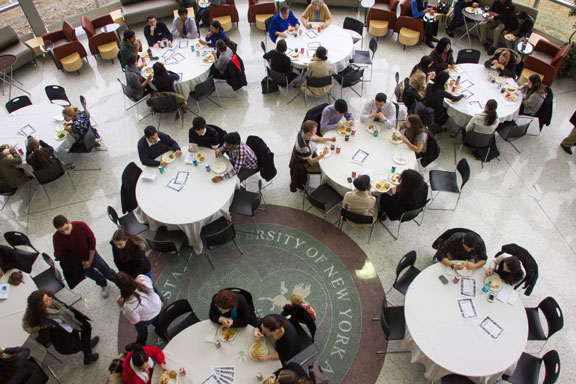
The Binghamton University chapter of Universities Allied for Essential Medicines (UAEM) held a global-health conference to work toward solving the worldwide medicine crisis.
UAEM is a network of university students with chapters across the United States that work toward improving global access to public health goods.
Speakers and panel members each took a turn at the podium to present their solution for closing the access gap, which refers to the one-third of the world’s population that lacks access to essential medicines.
Bryan Collinsworth, the keynote speaker and executive director of the UAEM, cited licensing and patent laws as a factor blocking essential medicines to developing countries.
“When the university, from the start, discovers something they think could save lives, they license it in such a way as to make sure it will be affordable in those countries,” he said.
Collinsworth praised UAEM for their efforts to solve issues related to global health.
“I think UAEM students are playing a really key and unique role in the global health discussion and they demonstrate how wide the range of opportunities for students to impact global health really is,” Collinsworth said.
Titilayo Okoror, an Africana studies professor, criticized the practice of simply using money to solve public health issues.
“I’ve been doing this now for 15 years — many parts of Africa, Ghana, Kenya, I’ve been there,” Okoror said. “One of the biggest problems I have is people go in, they see the problem, they throw money at it and they leave.”
Laura Terriquez-Kasey, a clinical assistant professor in the Decker School of Nursing, advocated against short-term responses to help countries, citing these methods as ineffective and unsustainable, especially in underdeveloped countries.
The conference opened with remarks from Hannah Keppler, the president of Binghamton’s UAEM chapter, and BU President Harvey Stenger.
One of UAEM’s on-campus missions is to have public health classes as a more significant part of the BU curriculum.
“There are a lot of pre-medical students like us [E-Board members] who are interested in public health and there’s not really many classes or programs or that kind of thing for us to do, but I think it would be something that people are interested in,” said Keppler, a senior majoring in biology.
About 140 people attended the event, which was sponsored by the Harpur College Dean’s Office, the Vice President for Research Office, residential community councils, the Student Association and the BU Convocations Committee.


